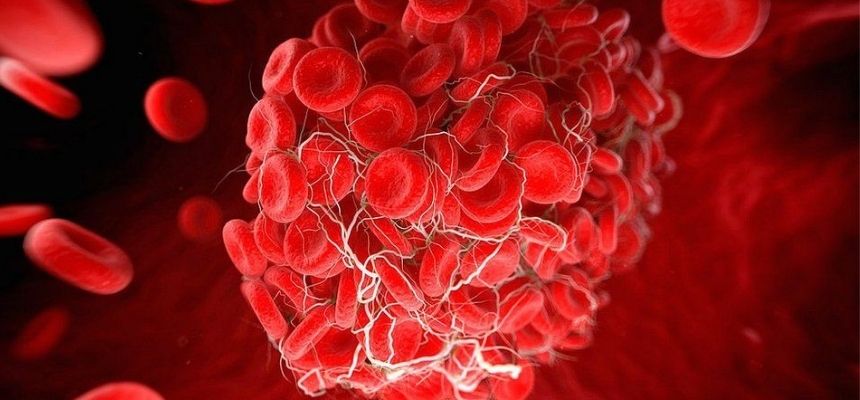The BBC presenter died at the age of 44 from a blood clot after having the Covid vaccine. As reported, award winning Radio Newcastle Lisa Shaw had severe headaches a week after vaccine and fell seriously ill days later. She died after being treated in intensive care for blood clots and bleeding. Experts explain the connection between blood clots and vaccines.
(1).jpg)
Blood clotting in humans is a protective phenomena in normal course . "Whenever we have a injury to the skin or any part of the body , blood flows out . If it is not arrested mechanical pressure or natural mechanism of body , it can be life threatning," says
Dr. Manas Kumar Panigrahi, Sr. Consultant Neurosurgery, Kims Hospitals adding, "Unfortunately anything excessive is harmful. Like food is essential for survival but excess of food can cause obesity , hypertension, diabetes, heart disease etc . Similarly if body reacts excessively to form clots in absence of external injury, is deleterious to body."
A rare occurrence
Rare blood clots have also been documented in people who have received the AstraZeneca vaccine. According to a study published in University of Oxford journal, clots occurred in about 5 in 1 million people after their first dose. The study also found that having COVID-19 puts you at risk for the rare clots.
People at risk
Whoever is affected with covid have a higher tendency of blood clot formation. "The spike proteins present on the surface of virus gets attached to the walls of blood vessels. The walls of blood vessels are lined by a layer of cells named endothelium. Endothelium gets damaged by the virus . Platelets present in blood gets accumulated in the damaged endothelium to repair it . Normally this doesn't obstruct the blood vessels as the clot size is small," says Dr Manas.
Symptoms
Patients with covid infection have excessive Angiotensin-converting enzyme (ACE) stimulation. "The ACE is present in blood vessels of limbs, brain, heart, liver, lungs etc. This excessive stimulation cause blood clots in all parts of body and can be harmful. If it happens in brain they have headache, seizures, weakness of limbs or unconsciousness. Blood clots in vessels of limbs cause blackening of skin. Blood clot in kidney causes kidney failure," says Dr Manas.
Treatments
People who have blood clots are often treated with a medication called a blood thinner, which reduces clotting in your body. Blood thinners can help prevent existing clots from getting bigger and keep new clots from forming.
One can reduce risk for blood clots in general by doing the following:
• Stay active. A sedentary lifestyle can increase your blood clot risk, so make sure to get regular exercise. If you need to sit for a long time — like with working or traveling — try to take regular breaks so you can get up and move around.
• Lose weight if you're overweight. Shedding excess weight can help lower your risk for developing blood clots.
• Don't smoke. Smoking can damage the lining of your blood vessels and cause clots to form.
• Know the side effects of medications. Some types of medications, including birth control pills, hormone replacement therapy, and certain cancer drugs, may increase your risk for blood clots. Work with your doctor to make sure these are properly managed to minimize the risk of blood clots.

(1).jpg) Blood clotting in humans is a protective phenomena in normal course . "Whenever we have a injury to the skin or any part of the body , blood flows out . If it is not arrested mechanical pressure or natural mechanism of body , it can be life threatning," says Dr. Manas Kumar Panigrahi, Sr. Consultant Neurosurgery, Kims Hospitals adding, "Unfortunately anything excessive is harmful. Like food is essential for survival but excess of food can cause obesity , hypertension, diabetes, heart disease etc . Similarly if body reacts excessively to form clots in absence of external injury, is deleterious to body."
Blood clotting in humans is a protective phenomena in normal course . "Whenever we have a injury to the skin or any part of the body , blood flows out . If it is not arrested mechanical pressure or natural mechanism of body , it can be life threatning," says Dr. Manas Kumar Panigrahi, Sr. Consultant Neurosurgery, Kims Hospitals adding, "Unfortunately anything excessive is harmful. Like food is essential for survival but excess of food can cause obesity , hypertension, diabetes, heart disease etc . Similarly if body reacts excessively to form clots in absence of external injury, is deleterious to body."
 Disclaimer: Welthi.com does not guarantee any specific results as a result of the procedures mentioned here, and the results may vary from person to person.
Disclaimer: Welthi.com does not guarantee any specific results as a result of the procedures mentioned here, and the results may vary from person to person.









